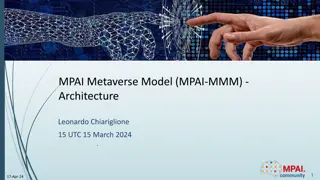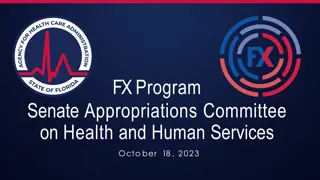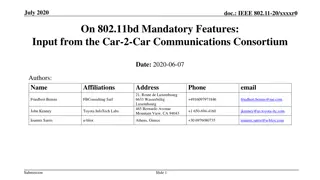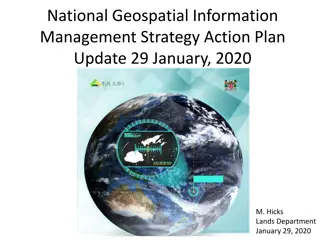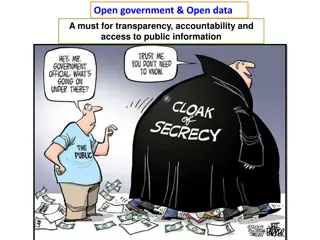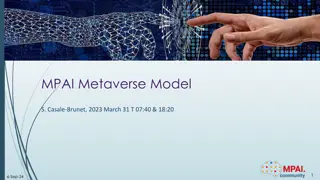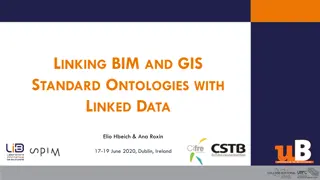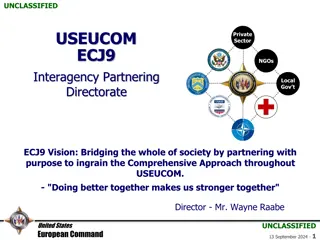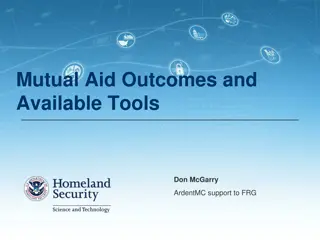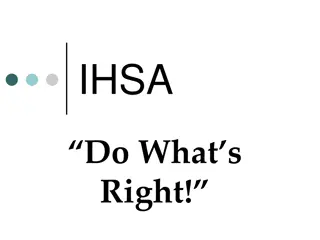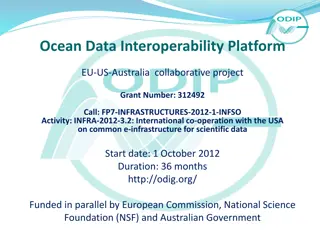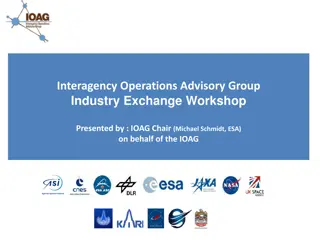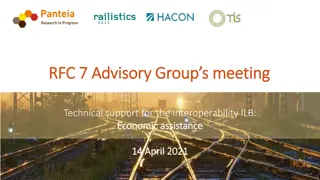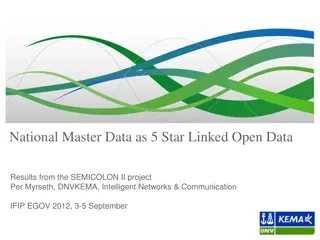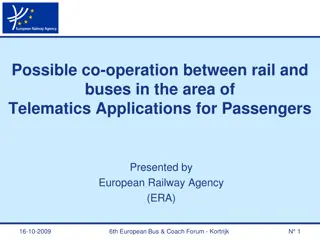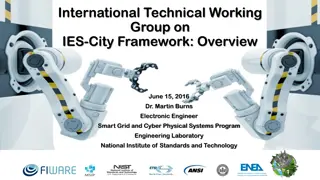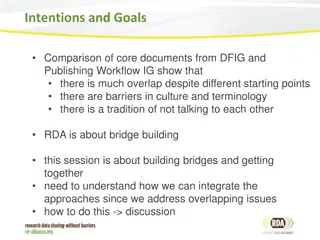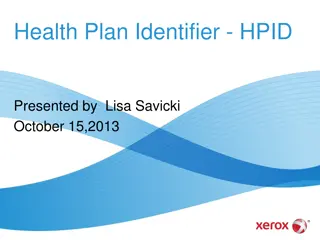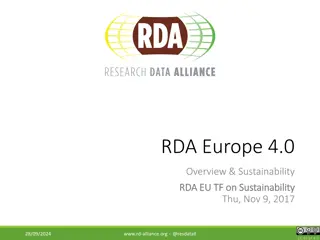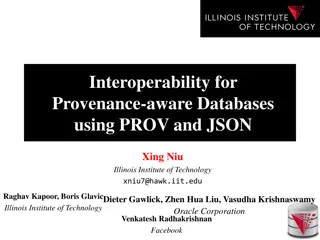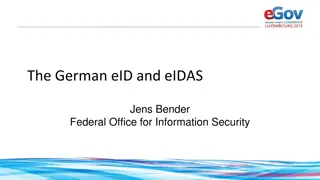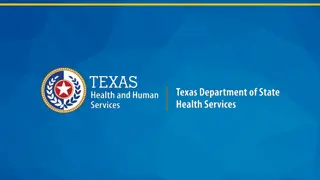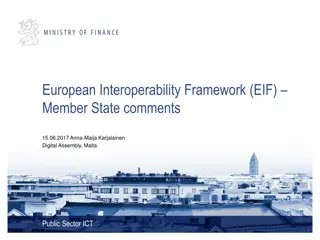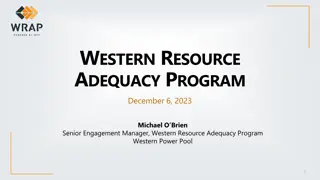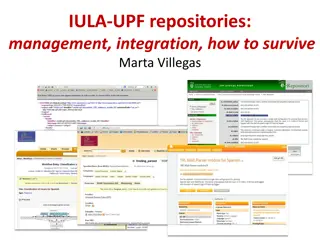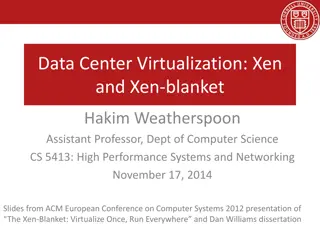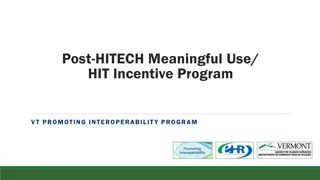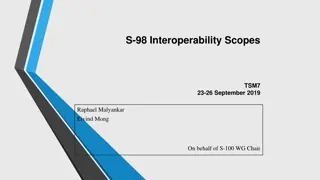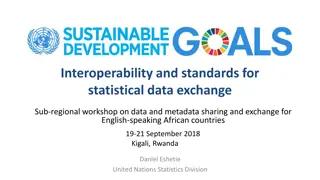Understanding MPAI's Role in Metaverse Interoperability
MPAI, spearheaded by Leonardo Chiariglione, plays a crucial role in defining standards and technologies for the metaverse, ensuring interoperability between different metaverse instances. This involves functional and prescriptive interoperability, enabling seamless data exchange and operation models
3 views • 38 slides
Enhancing Wheat Data Interoperability for Sustainable Production
The wheat research community faces challenges in meeting the increasing demand for wheat production due to a lack of data harmonization and standards. The Wheat Data Interoperability Working Group aims to improve the interoperability of wheat-related data through shared guidelines, tools, and recomm
4 views • 10 slides
United Nations Legal Identity Agenda and Civil Registration Guidelines
The United Nations Legal Identity Agenda aims to ensure legal recognition for all individuals through civil registration systems. This initiative, aligned with the 2030 Agenda for Sustainable Development, emphasizes birth registration and legal identity as fundamental rights. The agenda encompasses
1 views • 10 slides
Florida Medicaid Transformation Program Overview
Florida's Medicaid enterprise is undergoing a multi-year transformation to enhance its technology, processes, and operations through the FX Program. The program aims to deliver high-quality healthcare services to Floridians, replacing legacy systems with modern solutions. Key components include stra
2 views • 11 slides
Proposal for New 802.11bd 20MHz Mode for Enhanced ITS Interoperability
The document discusses the necessity of a new 802.11bd 20MHz mode for improved interoperability within Intelligent Transportation Systems (ITS) due to limitations with current Wi-Fi channels and the scope of 256-QAM modulation. It presents proposals approved by the Car-2-Car Communications Consortiu
0 views • 8 slides
The Impact of Interoperability in Education
Explore the significance of interoperability in education through insightful statistics and data. Learn how improved interoperability can benefit CTOs, teachers, and schools. Discover the challenges and potential solutions related to the seamless sharing of data and digital tools in educational sett
0 views • 30 slides
Shared Challenges in Biodiversity Informatics Collaboration
The Coalition of Open Biodiversity Infrastructures and Networks aims to enhance collaboration for comprehensive biodiversity data management and accessibility. They focus on delivering biodiversity knowledge effectively, enabling stakeholder participation, promoting open data sharing, mobilizing his
2 views • 13 slides
Delaware LIHEAP and Weatherization Assistance Program Details
In Delaware, the Low-Income Home Energy Assistance Program (LIHEAP) is managed by DHSS and DNREC, offering various components like Fuel Assistance Program (FAP) and Crisis Intervention Program (CIP). The program includes eligibility criteria, assistance types, and the Weatherization Assistance Progr
1 views • 5 slides
National Geospatial Information Management Strategy Action Plan Update
The National Geospatial Information Management Strategy Action Plan Update outlines five strategic goals focusing on governance, data, access, interoperability, and development. Under each goal, multiple action points are detailed, including reviewing council roles, updating legislation, coordinatin
3 views • 13 slides
Open Government Data and Sustainable Development Goals
Open government data and sustainable development goals go hand in hand, promoting transparency, accountability, and access to public information. Openness in data allows for universal participation, interoperability, and value creation. By striving for sustainable development and embracing open gove
2 views • 24 slides
The Road to Metaverse Interoperability: Challenges and Solutions
Metaverse standards and interoperability are crucial for unleashing the full potential of this transformative technology. However, the lack of common agreement on what a metaverse entails poses challenges. The MPAI roadmap addresses key steps towards achieving interoperability, including developing
0 views • 17 slides
OpenFMB Framework: Empowering Utility Interoperability
Open Field Message Bus (OpenFMB) is a framework and reference architecture designed to enable interoperability for Distributed Intelligence Applications, focusing on cybersecurity, microgrids, Distributed Energy Resources (DER), and more. It provides a standard API for Electric Grid interoperability
0 views • 16 slides
Understanding XTCE and SEDS in Mission Operations
XTCE (XML Telemetric and Command Exchange) and SEDS (Space Experiments Data System) are essential tools in mission operations. XTCE serves as a standard database language for telemetry and commanding, while SEDS provides a platform for managing space experiment data. These tools are related through
1 views • 13 slides
Term Overlap Among Matportal Ontologies
The study focuses on term overlap among 5 Matportal ontologies, assessing interoperability and semantic ambiguity. Results show high rates of URI matches between specific ontologies, with discussions on the implications and potential solutions for enhancing interoperability.
0 views • 7 slides
Linking BIM and GIS Standard Ontologies with Linked Data
Introduction to the need for seamless data interpretation between Building Information Model (BIM) and Geographic Information System (GIS), focusing on aligning BIM and GIS standard ontologies for semantic interoperability. Addressing the challenges of data interoperability layers and the characteri
0 views • 15 slides
Enhancing Security Through Whole-of-Society Approach
United States European Command (USEUCOM) and ECJ9 are working to integrate interagency, private sector, NGOs, and local government partners to strengthen defense, deterrence, and resilience. Their focus is on countering hybrid threats, enhancing interoperability, and promoting full spectrum resilien
0 views • 8 slides
Enhancing Mutual Aid Coordination Through FRESH and Vortex Tools
Outcomes and observations from a collaborative event on mutual aid information exchange involving stakeholders from various sectors. The use of FRESH and Vortex tools facilitated bridging interoperability challenges, promoting a simple, efficient, and easy-to-implement approach. Learn more about FRE
0 views • 12 slides
IHSA Do What's Right Program: Promoting Sportsmanship
The IHSA Do What's Right Program focuses on promoting and recognizing sportsmanship within teams, schools, and communities. It sets minimum guidelines for positive behavior, encouraging modesty in victory, graciousness in defeat, and respect for officials. The program benefits students, coaches, and
0 views • 24 slides
Ocean Data Interoperability Platform: EU-US-Australia Collaborative Project
This collaborative project, funded by the European Commission, National Science Foundation (NSF), and Australian Government, aims to develop a collaboration platform for organized dialogue between partners from Europe, the USA, and Australia. The project focuses on establishing a coordination platfo
0 views • 9 slides
Interagency Operations Advisory Group Industry Exchange Workshop Summary
The Interagency Operations Advisory Group (IOAG) facilitates collaboration among international agencies for space communications policy, procedures, and technical interfaces to ensure safe, secure, and efficient mission operations. It aims to enhance interoperability, network responsiveness, and thr
0 views • 30 slides
Analysis of Economic Assistance and Impacts on Interoperability at RFC-7 Advisory Group's Meeting
Overview of the RFC-7 Advisory Group's meeting discussing technical support for interoperability and economic assistance through the CBA methodology. The results from three case studies and the identification of remaining issues are presented, highlighting the direct and indirect impacts of solving
0 views • 6 slides
Improving Interoperability with Linked Open Data in the SEMICOLON II Project
The SEMICOLON II project aimed to enhance eGov solutions by utilizing Linked Open Data principles to open up public registers and create semantic technologies. The project spanned from 2007 to 2013 with a budget of approximately $15 million, focusing on core national master data maintenance and moti
0 views • 25 slides
Advancing CAM Physics Framework: Challenges and Innovations
Community Physics Framework (CPF) addresses challenges in CAM6 architecture, promoting interoperability for new physics suites while enhancing model flexibility. The CPF aims to replace hardcoded logic with a more adaptable, data-driven approach for seamless integration of physics parameterizations
0 views • 17 slides
European Railway Agency's Role in Promoting Cooperation between Rail and Buses in Telematics Applications
The European Railway Agency (ERA) plays a crucial role in enhancing cooperation between rail and buses through Telematics Applications. Established in 2004, ERA focuses on recommending legislation, ensuring interoperability, and enhancing safety in the European rail network. Recommendations made by
0 views • 17 slides
Advancing Smart Cities: IES-City Framework Overview
The International Technical Working Group on IES-City Framework, led by Dr. Martin Burns, is developing a reference framework for IoT-enabled Smart City technologies to streamline architectural designs and enhance interoperability. The group aims to create a common set of features for Smart Cities,
0 views • 74 slides
Building Bridges and Integrating Approaches in Research for Efficiency and Interoperability
Despite different starting points, there is significant overlap in the core documents of DFIG and Publishing Workflow IG. The session focuses on integrating approaches to address overlapping issues, with an emphasis on building bridges between diverse research cultures and terminology barriers. Key
0 views • 16 slides
Understanding Health Plan Identifiers: HPID vs. OEID
Health Plan Identifiers (HPIDs) play a crucial role in the healthcare industry by uniquely identifying health plans during electronic transactions. This article delves into the significance of HPIDs, the distinction between Controlling Health Plans (CHP) and Subhealth Plans (SHP), and the comparison
0 views • 17 slides
RDA Europe 4.0 Sustainability and Development Overview
RDA Europe 4.0 is a global forum promoting research data interoperability, providing a neutral space for collaboration among 6000+ international experts. It emphasizes problem-solving with bottom-up approaches, aiming to synchronize stakeholders on national, European, and global levels. The sustaina
0 views • 9 slides
Interoperability for Provenance-aware Databases Using PROV and JSON
This research paper discusses the challenges in tracking database provenance and proposes a system, GProM, that computes provenance for database operations. It highlights the importance of exchanging provenance information between systems and the limitations of current relational database systems in
0 views • 28 slides
German eID and eIDAS: Secure Digital Identification Overview
The German eID system, including eIDAS integration, offers secure digital identification services through government-issued ID cards with embedded chips. It allows citizens and service providers to authenticate each other securely online. The system emphasizes interoperability and privacy protection
0 views • 16 slides
Update on Health Information Technology & Policy Committee Insights
The update on health information technology covers recent developments in federal actions related to healthcare reimbursement rates and interoperability rules. Changes in the Medicare Inpatient Prospective Payment System and Hospital Promoting Interoperability Rule impact hospitals, requiring partic
0 views • 12 slides
European Interoperability Framework (EIF) Member State Comments by Anna-Maija Karjalainen
Anna-Maija Karjalainen, Director General of Public Sector ICT in Finland, shares insights on the European Interoperability Framework (EIF) and Finland's progress towards interoperable digital services. The EIF aims to enhance the delivery of public services across Europe, promoting open data, semant
0 views • 5 slides
Western Resource Adequacy Program Overview
Western Resource Adequacy Program (WRAP) is a vital initiative in the Western Power Pool, providing valuable grid integration and coordination services to its customer-members across the entire Western Interconnection. As the Program Administrator, Western Power Pool undertakes all necessary actions
0 views • 11 slides
Challenges in Integrating Different Repositories for Metadata Interoperability
Addressing the integration of repositories with varying schemas and protocols such as OAI-PMH and APIs is crucial for ensuring metadata interoperability. The key requirements include maintaining data integrity through a centralized editing point, leveraging automatic import/export mechanisms, and ad
0 views • 8 slides
Xen-Blanket: Virtualize Once, Run Everywhere
The Xen-Blanket, introduced by Hakim Weatherspoon, aims to address challenges in cloud computing such as lack of interoperability and efficient resource utilization. It enables uniform VM images, advanced hypervisor management, and seamless migration between clouds. The second-layer hypervisor enhan
0 views • 28 slides
Vermont Promoting Interoperability Program Overview
The Vermont Promoting Interoperability Program, formerly known as the Electronic Health Record Incentive Payment program, incentivizes Medicaid providers to adopt, implement, and meaningfully use electronic health records. This program, funded mostly by federal dollars, aims to improve interoperabil
0 views • 16 slides
Strategies for Promoting and Supporting an Athletic Band Program
Explore various strategies for promoting and supporting an athletic band program, including recruiting initiatives, administrative and community support, solid teaching practices, and outreach efforts. Learn about the structure of the band program, key personnel involved, and engagement activities s
0 views • 17 slides
Meeting Summary: Interoperability and Gas Quality in Gas Regional Initiative
Discussion highlights from the 38th IG Meeting of the South Gas Regional Initiative teleconference held on July 18, 2016. Focus on interoperability, latest developments, and next steps in the region. Key topics include Interconnection Agreement requirements, gas flow control, gas quantity allocation
0 views • 24 slides
S-98 Interoperability Scopes Overview
This paper discusses options for defining interoperability scopes, restructuring the draft S-98 interoperability specification, and assessing the implications of implementing different levels of interoperability. It suggests a phased introduction with pauses for evaluation, focusing on lower complex
0 views • 8 slides
Enhancing Statistical Data Exchange and Interoperability in African Countries
Sub-regional workshop in Kigali focused on the challenges and importance of modernizing statistical data exchange and dissemination in African countries. The Cape Town Global Action Plan emphasizes the need for innovation and modernization of national statistical systems, including the development o
0 views • 17 slides
